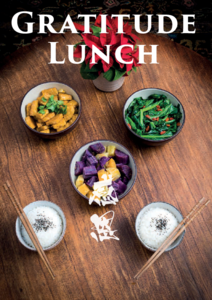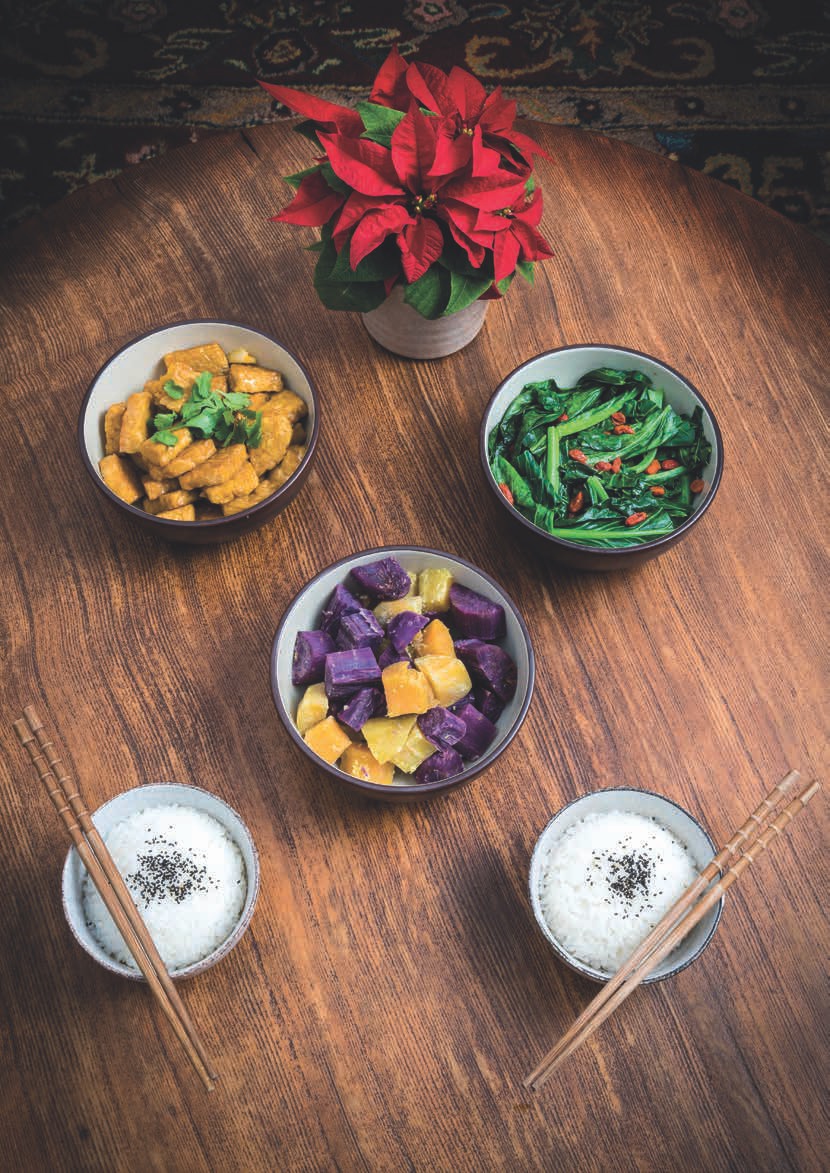
 |
|

Wu De often says that gratitude is one of the essential ingredients in a happy, healthy life. Every Tuesday is "Gratitude Lunch" here at the Center. As we eat, we go around the table and talk about whatever it is we are grateful for this week. This practice has become an important part of the schedule here, and we all notice the difference in the rare week when we miss out on sharing our gratitude.
It is helpful to start by understanding gratitude in the way it is applied in self-cultivation. Gratitude is so much more than just being thankful; it is a readiness to show appreciation and return kindness to others. The appreciation of life and specific events, as well as a willingness to return kindness to the people in our lives, are both worth discussing in more detail before beginning a gratitude lunch practice like we have here at the Center.
When we are grateful to a situation, or life in general, we are, in fact, saying "yes" to what is. This runs contrary to our normal, egoic patterns where we are always busy arguing with Reality. So many of the great sages of humanity, including the Buddha, offered us the insight that we often suffer unnecessarily by wanting what is to be is not or wanting what isn't to be is - arguing with Reality, in other words. He often urged his students to contemplate the truth with the words "as it is!" A more modern sage, Byron Katie, often says, "The problem I see in arguing with Reality is that Reality wins 100% of the time!" Learning to say "yes" to the way things are is acceptance when things are not going the way we'd like, and gratitude when things are. Saying "yes" to this moment, this now, is actually a "yes" to all that has ever been, since all moments are connected in infinite causal chains. When you affirm any moment in your life, any configuration of experience, you are also avowing the world as it is. This is an essential aspect of being happy and healthy.
When we learn to affirm the world as it is, we stop taking our blessings for granted. Many times we get so used to water coming out of faucets and shower heads, we forget that many people don't have clean water, let alone plumbing. We live our whole lives with electrical outlets and lights, oblivious to our ancestors who went without these comforts. (When you travel through developing countries and the power goes out regularly, you start to cultivate gratitude for electricity.) Food is the perfect place to start such a practice. All too often we need to remember how blessed we are to be so abundantly provided for by Mother Earth. There are people who are right now suffering through tremendous pain. Near to your home, or wherever you sit reading this article, there is a children's cancer ward full of bald little angels, many in great pain and dying. There is little you or I can do for them, sitting here before our meal. But in their heart of hearts - in their highest self - they are okay with it so long as we honor what we have. If we honor our healthy bodies and don't take our lives or our food for granted, all is well under the sun. Not taking the basics for granted is an important part of being worthy of our food, and all the energy and sacrifice that went into it.
The more we cultivate gratitude, the more we learn to love and appreciate this world. We have spent too much of our life struggling with ourselves, others and our environment. Peace happens when we call a cease-fire - when we affirm that things are okay in this moment. Acknowledging blessings in our life out loud is marvelous training, because it teaches us to recognize them more and more as they arise. As we set time aside to speak out the things we are grateful for, we become more conscious of them, learning to look out for them in the future. This means we honor life more, which is a huge part of really, thoroughly enjoying our precious time on this Earth!
In relation to others, a gratitude practice helps us develop one of the Six Perfections in Buddhism, called "loving-kindness." You can be kind for many reasons: maybe you want something or just respect the person you're being kind to. But when you love kindness itself, you start to cultivate kindness for its own sake. Gratitude helps us to cultivate a readiness to return kindness to others who offer it to us, opening our heart and helping us to love kindness itself more and more as we experience the benefits of doing so.
The more we say "yes" to the world, the more grateful we become and then we say "yes" more, and so on... Don't underestimate the act of sharing what you are grateful for consciously. You can do this by listing your blessings in a journal or saying them out loud like we do at Gratitude Lunch every week. We try to practice being as specific as possible in our expression of what we are grateful for, focusing on just the past week alone. This is important, as beginners have a tendency to resort to the bigger picture when expressing gratitude ("my mom," "this food," "the Earth," etc.), which is okay if you have a genuine reason to be grateful for those things over the course of the last week. However, when we are too general it is often a cop-out and doesn't really affect the feeling of gratitude in the heart, which is more relevant than the words we say out loud. Also, by focusing on specific instances, we are training ourselves to catch future instances and celebrate them as they happen. And that is very powerful! When you learn to acknowledge and celebrate even small blessings throughout the week, you will have many more reasons to honor your precious life by living happily day to day. For that reason, it is very helpful to be as granular and specific in your gratitude exercises as you possibly can. You can do this by limiting the time to a day, or a week as we do, or you could find another way to make your gratitude work more specific; for instance, unpacking each thing you are grateful for and describing each of the details within that person or situation that make you thankful. Gratitude Lunch is the perfect opportunity to practice becoming more sensitive to all the myriad mystical, magical moments that are happening around you all the time!
This practice works to change things in the present and future. It forces you to acknowledge all your blessings, which is inspiring and uplifting. It also helps you to develop a real love for the kindness of others and a desire to return it. You stop taking all your abundance for granted. You learn to celebrate your life more, which makes life happier and improves your overall well-being. As you practice expressing your gratitude, you inspire yourself to feel more thankful. This definitely affects your attitude and happiness, and it also inspires others who live and work with you to be more positive!
The love of kindness, hospitality and gratitude are central to a life of tea. They are very much a part of the spirit of tea. And being grateful for your food and tea will make you a better guest and host, improving all your ceremonies to come!